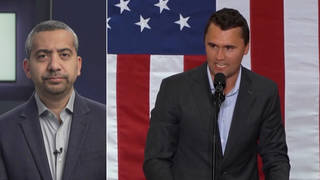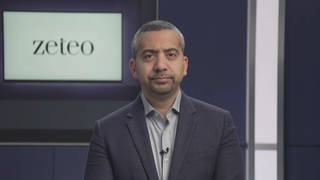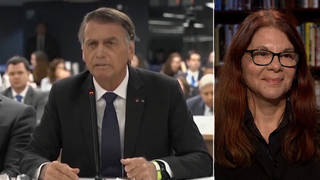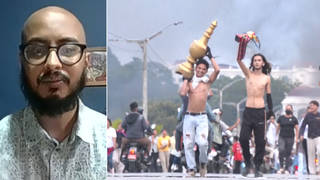
As international attention continues to remain firmly focused on Iraq, the Middle East and the Tsunami, there is another volatile situation that is reaching a boiling point in Nepal. Nine days ago the country’s king seized full control of the country and sacked the interim government. [includes rush transcript]
Nine days ago, the country’s king appeared on Nepal’s state-run TV network, announcing a state of emergency. The King sacked the interim government and ordered a shutdown of the country’s telephone and internet communications. Newspapers and radio stations were shutdown and a ban was imposed on all news reporting. Pro-democracy groups say that the move handed total control of the country to the Royal Nepalese Army under the direction of the King.
Since 1996, Nepal has faced an armed insurgency by Maoist rebels operating largely in the countryside and large pro-democracy protests in the capital Katmandu. After declaring the state of emergency on February 1st, the King’s forces, which include the Nepalese Army, began rounding up activists, arresting scores of people and distributing watch lists of political activists to arrest if they attempt to leave the country. The monarchy and its forces receive significant military backing from the United States, the UK and India. Pro-democracy activists are now increasing their calls for a ban on military sales to Nepal.
We are joined on the phone by Mary Des Chene, an anthropologist and human rights activist who has worked in Nepal over the past 20 years. She is editor of the Kathmandu-based journal “Studies in Nepal: History and Society.”
In our Washington studio, we are joined by Chitra Tiwari, a journalist and analyst who writes frequently for the Washington Times. He formerly was a lecturer in political science at Nepal”s Tribhuvan University.
- Chitra Tiwari, Washington-based journalist and analyst. He writes frequently for The Washington Times. He formerly was a lecturer in political science at Nepal”s Tribhuvan University.
- Mary Des Chene, is an anthropologist and human rights activist who has worked in Nepal over the past 20 years. She is editor of the Kathmandu-based journal “Studies in Nepal: History and Society.”
Transcript
AMY GOODMAN: We’re joined on the telephone by Mary Des Chene, an anthropologist and human rights activist. Who’s worked in Nepal for the past 20 years. She is editor of the Kathmandu based journal, Studies in Nepal: History and Society. In our Washington studio, we are joined by Chitra Tiwari, a journalist and analyst who writes frequently for the Washington Times. He formerly was a lecturer on political science at Nepal’s Tribhuvan University. We welcome you both to Democracy Now! Let’s turn first to Chitra Tiwari. What is happening in Nepal right now? Why did the king fire the entire government and the roundups that are going on?
CHITRA TIWARI: What’s happening in Nepal at the moment is a consequence of the long-running insurgency in Nepal. Back in 1996, Maoists started the insurgency, and the insurgency became powerful day by day, and it came to a situation where they imposed blockade of Katmandu valley for two times and they were succeeding day by day. And the king thought that his position is at stake and political parties were not able to save his position. As a result he probably thought that either he had to take command of everything, or he would lose his throne. So, it’s kind of a situation in which actually the monarchy is running out of its time, and in a desperate move, he has taken action. But I don’t think he is going to control the situation in his favor. Because the insurgency is turning itself into the revolution. And the problem now is that since the monarchies are desperate to save themselves from the Maoists take over, they are likely to use the military force to the fullest extent, inviting genocide and war in Nepal. That’s a very disturbing situation, on the line. The United States has supplied weapons to the Nepalese army, India has supplied and so has the British government. Although these governments have denounced the king’s recent move but still, they’re faced with the moral predicament. The king has given the message to these international backers, international friends of him that either you are with me, or you are with the Maoists, which side you are on? So, even though there is international outburst, the foreign governments are opposing the king’s move, but still there is a sense that the supply of arms, ammunition, would continue there, so this is a measure that would impact at this moment.
AMY GOODMAN: Mary Des Chene, anthropologist and human rights activist, can you talk about the background to all of this? When did all of this begin?
MARY DES CHENE: Yes. You can — as in many of these protracted situations, you can go back to several points. The most immediate point is 2001 with the massacre of the reigning king and his family, after which this current king has taken over. The larger and longer struggle that I hope we can talk about a little bit is one for any semblance of democracy in Nepal, which we should date back to 1949, when the political parties — some of them were formed earlier than that, but was really forming in first what’s called the revolution in Nepal took place in 1950, which ironically put the grandfather of the current king back into power. He had been locked up in his palace for 100 years prior to that. But speaking for the moment with the present, it’s very crucial to understand first, I think, that this is a military coup. The fact that the supreme commander in chief of the army happens to be also a king does not change that fact. One of the two theories to really keep that in the forefront, one is the international obligations that kick in, because this is a military coup. And the second is that there’s a strong effort going on, P.R. effort going on by the king, and the palace, to normalize and legitimize what he has done, and to act as if there is some sort of a normal and acceptable and even democratic governance going on in Nepal. Those things are entirely false and it’s the international organizations and governments accept it, as Chitra has said, we’re heading for an even harsher and I believe he used the word genocidal war in Nepal.
AMY GOODMAN: What about the U.S. Role, Britain’s role, India’s role?
MARY DES CHENE: Well, up through — in 2002, the United States started to really jack up its, ramp up its military aid, and the U.K. and India have followed in cooperated. There was a strong campaign against that at the time. I was very active in organizing academics here in the United States, and so at that point, I looked very closely into what the United States’ argument was and their logic was clear, or their illogic, which is that the way to deal with the insurgency, as they say, or deal with the Maoist problem was two-pronged approach in which they would try to whip them militarily, and there comes the logic of pouring in arms which has been going on, and the second is that you have a hearts and minds campaign. And we all know that term from Vietnam. And so, then money going into N.G.O.s and I.N.G.O.s, and claims that they’re going to actually develop extremely poor parts of the country and put in roads, all so-called humanitarian aid has become counter-insurgency aid over the last few years. Now, this sort of strategy simply, a, does not work. That was part of our point, and will only exacerbate the war. But that has been ignored. That’s the tack that’s been taken. Now one hears the brigadier general, the spokesperson of the Nepal army, repeating precisely that time that line, what they are now going to do, that the —- they are going to attack even more heavily militarily on the one hand and on the other hand, you have the king coming out with his 21-point poverty -—
AMY GOODMAN: I want to end with Chitra Tiwari, and ask, we only have about 30 seconds, but what do you think needs to happen right now?
CHITRA TIWARI: What needs to happen right now is that the king, government should be told in unequivocal terms that human rights violations will not be accepted, the international community has a role to play, and any use of the arms supplied to deal with the insurgency is likely to be used against a civilian population, of the 11,000 people killed, 75% of the people are been killed by the army of the king, and this position is going to be increased. That being the case, either the arms has to be stopped or the anything that is in the pipeline has to be put on hold.
AMY GOODMAN: Well, I want to thank you both for being us with. We’ll certainly continue to follow developments in Nepal. Chitra Tiwari, Washington based journalist and analyst born in Nepal; Mary Des Chene, anthropologist and human rights activist, worked in Nepal for the last 20 years.











Media Options